Ukrainian authorities have launched a concerted assault on the nation’s anti-corruption institutions and the political opposition over the past week, triggering a major backlash from the West.
The Verkhovna Rada on Dec. 7 fired Yegor Soboliev, an outspoken critic of President Petro Poroshenko and a staunch defender of anti-corruption institutions, as chairman of parliament’s anti-corruption committee.
This is seen as yet another offensive in the authorities’ campaign against the National Anti-Corruption Bureau of Ukraine, or NABU, that in past weeks went from sabotage to all-out war.
The bureau has irritated the authorities by aggressively trying to investigate and take on top-level graft.
The parliament committee that used to be headed by Soboliev has the power to stop bills that concern the NABU and other anti-graft initiatives, like the long-delayed creation of the anti-corruption court.
Moreover, the heads of the two dominating factions in parliament, Artur Herasymov of the 136-member Poroshenko Bloc, and Maksym Burbak, chief of the 81-member People’s Front faction, on Dec. 6 submitted a bill that would allow Poroshenko and the Verkhovna Rada to fire NABU chief Artem Sytnyk without an audit of the bureau. Under current law, Sytnyk can only be fired if an audit shows the bureau is performing poorly.
However, the bill was removed from parliament’s agenda early on Dec. 7 after strong criticism by Western officials overnight.
“These steps are part of a major plan that entered its active phase last week whose aim is the destruction of the NABU and the anti-corruption prosecutor’s office, the blocking of investigations against top officials and an attempt to help top corrupt officials escape punishment,” the NABU said on Dec. 7.
While leading the assault against NABU, the law enforcers also went after one of the most active opposition politicians.
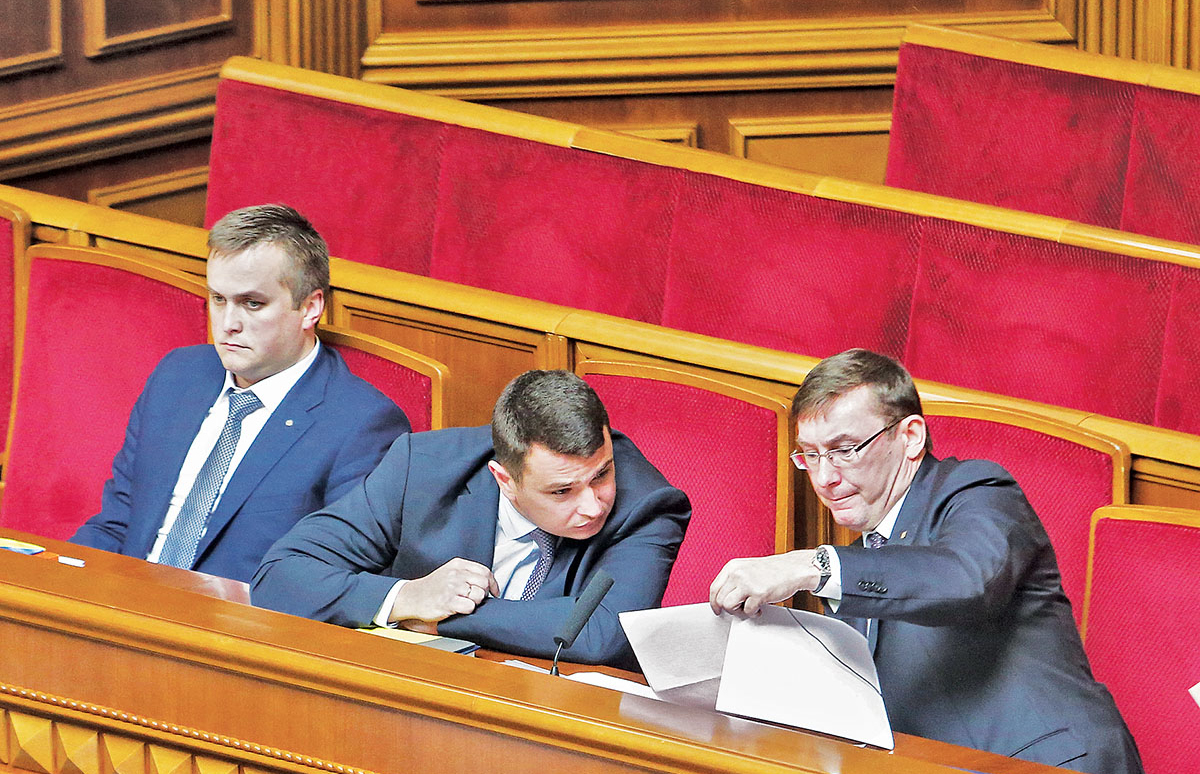
Prosecutor General Yuriy Lutsenko (R) with Artem Sytnyk, head of the National Anti-Corruption Bureau (C), and Nazar Kholodnytsky, the chief anti-corruption prosecutor (L), in parliament on July 5. Lutsenko has lashed out at Sytnyk as the authorities try to restrict the NABU’s independence. (Volodymyr Petrov)
Later that day, Prosecutor General Yuriy Lutsenko, at a briefing in Kyiv, accused Saakashvili of getting funding from oligarch Serhiy Kurchenko, an ally of the ousted former President Viktor Yanukovych, to finance protests against the authorities and plot a coup d’etat.
Saakashvili said the case was fabricated and politically motivated.
The SBU and the prosecutor’s office did not respond to repeated requests for comment.
Attack on NABU
Oleksandr Lemenov, an anti-corruption expert at the Reanimation Package of Reforms, believes there will be more attempts to destroy the NABU.
“Many attacks on the NABU, the anti-corruption prosecutor’s office and the electronic asset declaration system have been stopped by (Sobolev’s) committee,” he told the Kyiv Post.
On Dec. 1, Sytnyk also accused the authorities of foiling all NABU undercover operations and trying to destroy the bureau.
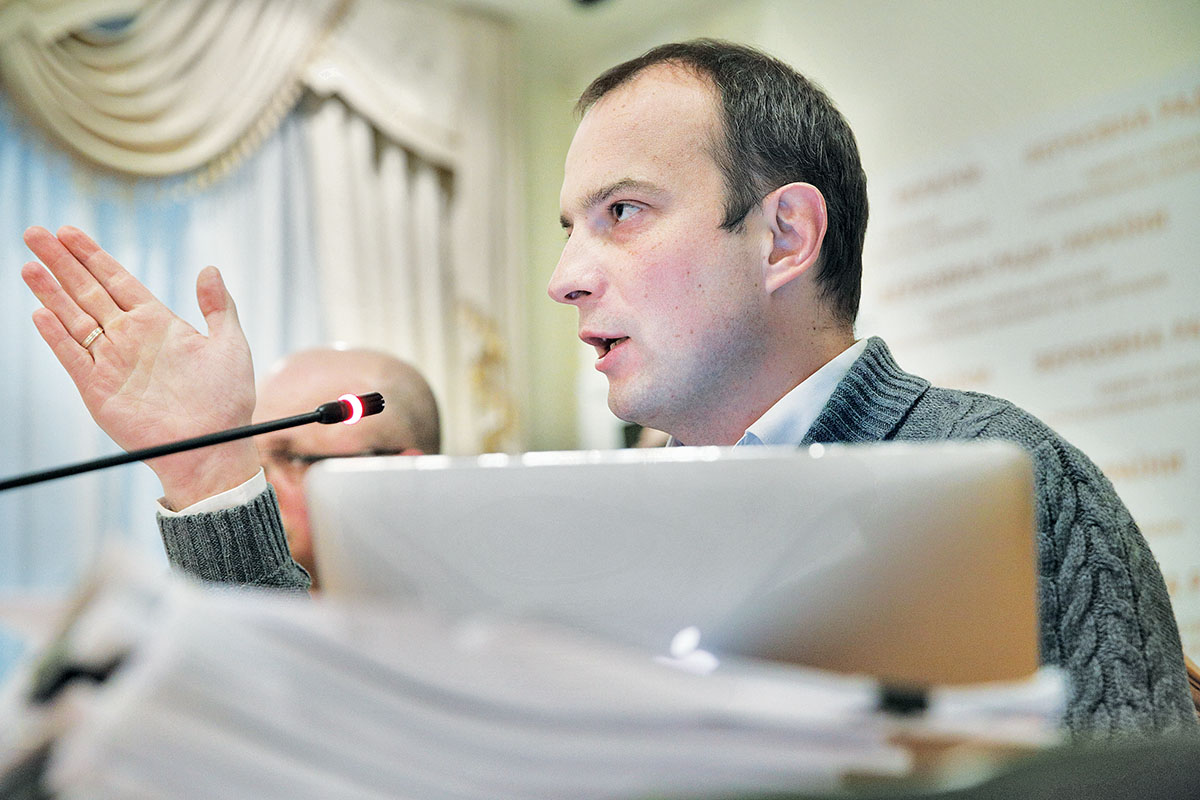
Yegor Soboliev, the former head of parliament’s anti-corruption committee, speaks on Nov. 15 at a committee meeting. Soboliev, a defender of independent anti-corruption institutions and a vocal critic of President Petro Poroshenko, was dismissed as committee head by the Verkhovna Rada on Dec. 7. (Volodymyr Petrov)
He said that the SBU and the Prosecutor General’s Office had foiled NABU operations by illegally publishing the personal data of NABU undercover agents, blowing their covers. The agents were investigating corruption in the State Migration Service. The SBU and the Prosecutor General’s Office denied accusations of wrongdoing.
The SBU on Nov. 30 detained seven undercover NABU employees involved in the State Migration Service case, and charged one of them with provoking an official from the service to solicit a bribe — a charge that the bureau denies.
The NABU also said on Nov. 15 that it would have to stop all of its ongoing graft investigations if the Prosecutor General’s Office transferred its graft cases to the bureau after the Nov. 20 deadline set by Ukrainian law, as it would be overloaded with work.
Meanwhile, the NABU’s investigation against alleged corruption at the National Agency for Preventing Corruption was on Nov. 28 was transferred on the orders of the Prosecutor General’s Office from the NABU to the presidentially controlled SBU.
The transfer of the case to the SBU is deemed by critics to be an effort to bury the investigation, since the SBU is controlled by the Presidential Administration, which was accused by Hanna Solomatina, a whistleblower at the NAPC, of influencing her agency.
West reacts
Sobolev’s dismissal and the draft law that would have enabled the parliament to fire the NABU’s chief triggered a new wave of criticism from the West.
The bluntest remark came from Michael Carpenter, foreign policy advisor to former U. S. Vice President Joe Biden.
“If the Rada votes to dismiss the head of the anti-corruption committee (Sobolev) and the head of the NABU, I will recommend cutting all U.S. government assistance to Ukraine, including security assistance,” he tweeted on Dec. 6. “This is a disgrace.”
The Rada did dismiss Sobolev the next day, but the NABU bill was removed from the agenda amid Western pressure.
Christine Lagarde, managing director of the International Monetary Fund, Ukraine’s biggest foreign lender, said she was “deeply concerned by recent events that could roll back progress in anti-corruption efforts.”
Swedish Ambassador in Ukraine Martin Hagstrom noted that the independent anti-corruption agencies, in particular the NABU, “are an important part of the Visa Liberalization Action Plan for Ukraine, which has led to visa-free travel with the European Union.”
The ambassador’s words echoed domestic critics who voiced concerns that visa-free travel with EU, which is seen as Ukraine’s biggest achievement in the past three years, can be taken away if the authorities continue to undermine anti-corruption initiatives.
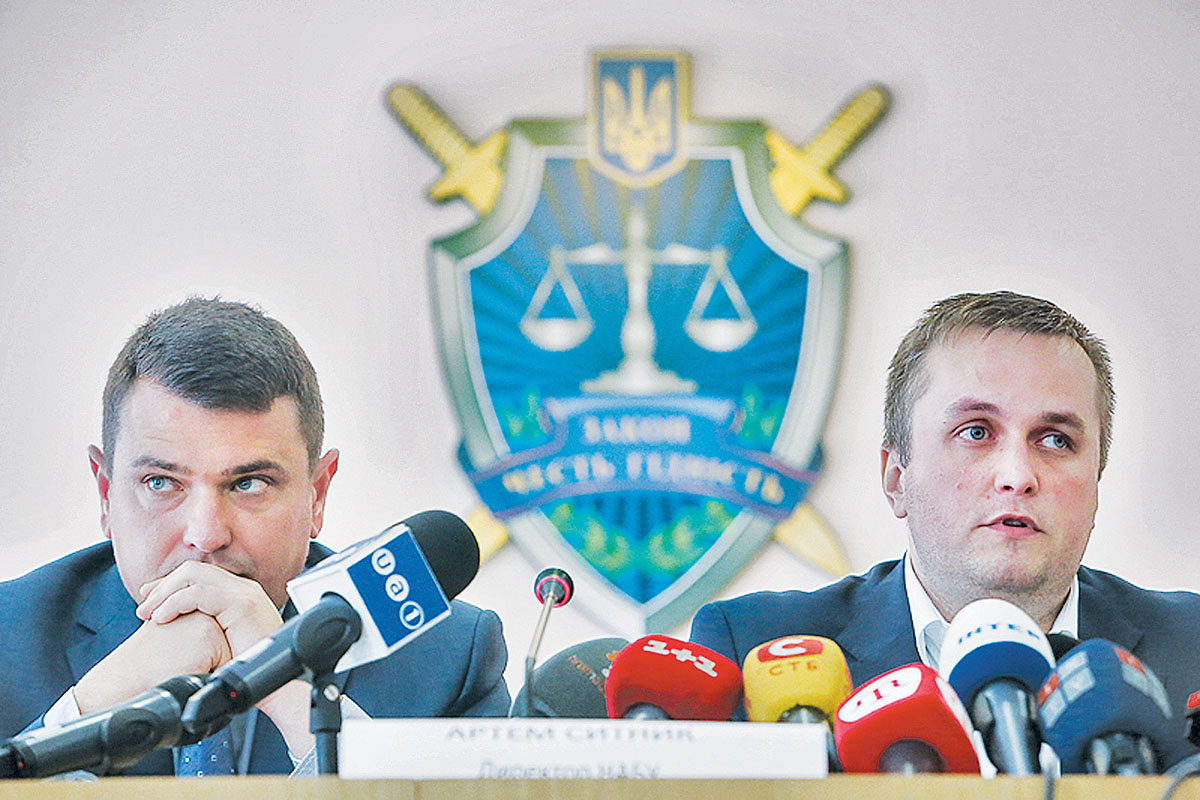
Artem Sytnyk, head of the National Anti-Corruption Bureau and Nazar Kholodnytsky, Ukraine’s chief anti-corruption prosecutor, speak with journalists during their press conference on July 1. (Volodymyr Petrov)
Washington, D.C., visit
Sytnyk and Chief Anti-Corruption Prosecutor Nazar Kholodnytsky were representing Ukraine at the Global Forum on Asset Recovery in Washington, D.C. on Dec. 4–6.
During the forum, Sytnyk said that it could be one of his last days as chief of the NABU.
Lutsenko canceled his visit to the forum several hours before its official start on Dec. 4, saying he was busy organizing the Dec. 5 arrest of Saakashvili.
Lutsenko summoned Sytnyk and Kholodnytsky to Ukraine to address the Ukrainian parliament together with him on Dec. 6, but they stayed at the forum.
Criticism of FBI
Lutsenko claimed on Dec. 3 that joint operations by the NABU and the FBI were illegal.
The U. S. Department of State denied the accusations on Dec. 5, saying that the FBI was helping “build anti-corruption and asset recovery capacity and strengthen Ukraine’s overall anti-corruption efforts.” “U.S. support has contributed to 333 criminal proceedings, 207 notices of suspicion, and the finalization of 108 indictments in cases related to corruption,” the Department of State said.
Both Lutsenko and pro-government lawmakers have made anti-Western statements in recent days.
Yevhen Deidei, a People’s Front lawmaker charged by the NABU in a graft case, quipped on Dec. 7 that “Sytnyk and Kholodnytsky have gone to Washington to bow before their bosses.” Radical Party Leader Oleh Lyashko also accused them of “obeying the orders of a foreign government.”
Anti-corruption court
Western criticism also apparently prompted Poroshenko to say on Dec. 7 that he would submit a bill on the creation of an anti-corruption court within seven to 10 days if the Verkhovna Rada fails to make a proposal on the issue by the beginning of next week.
Poroshenko’s critics say the statement is just another deceptive ploy. He missed his previous deadline for submitting the bill — Nov. 20. Poroshenko has also been actively opposing the court’s creation ever since a judicial reform law was passed in mid‑2016.
Lemenov said the creation of an anti-corruption court would make no sense if the authorities destroy the NABU’s independence.
“It’s the same as giving someone new sneakers and cutting off their feet,” he added.
If those in power eventually allow it to be created, the anti-corruption court will be set up in late 2018 at the earliest, he predicted.
“But don’t forget that we will have both presidential and then parliamentary elections in 2019,” Lemenov added. “That’s why the president will be delaying the creation of this court because (criminal cases against Poroshenko’s allies) will lower his rating.”
Saakashvili case
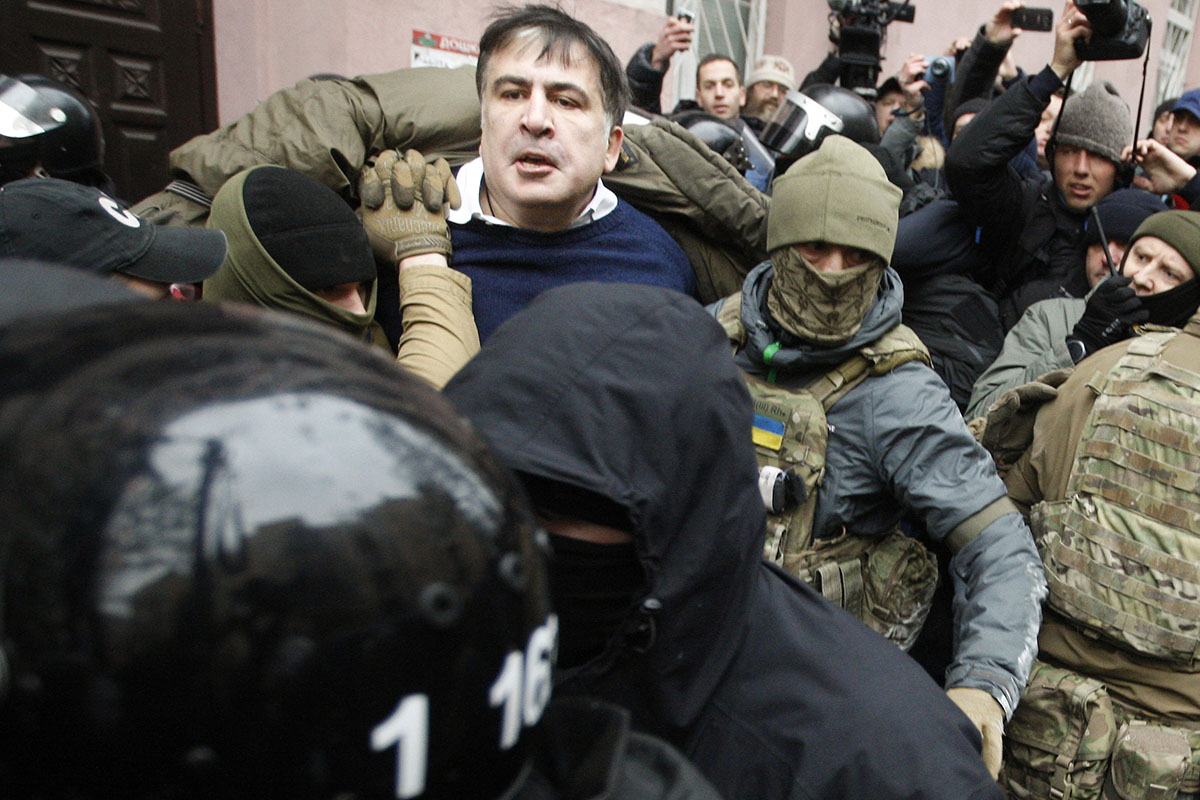
Police and members of Ukrainian security services detain former Georgian president Mikheil Saakashvili in Kyiv on Dec. 5. (AFP)
The assault on the anti-corruption institutions came as the authorities cracked down on opposition politicians who are exposing the government’s corruption.
“We have seen the way a dictatorship was being cemented in Ukraine and the way the rule of law was being violated,” Saakashvili’s lawyer Roman Chornolutsky said on Dec. 6, referring to the effort to detain Saakashvili.
Saakashvili and his lawyers said that the attempt to arrest him on Dec. 5 was illegal because the police and the SBU did not give them any notice of suspicion, arrest or search warrants, did not allow two of Saakashvili’s three lawyers to be present during his detention and used physical force against one of them. They called the attempt to detain him “a crime” and “a kidnapping.”
Saakashvili’s lawyers and the Kyiv Post could not find any detention warrant for Saakashvili in the official court register.
Moreover, the detention of Saakashvili was illegal because the detention of a person for a crime of medium severity by prosecutors and the SBU is only possible if he or she is caught red-handed, which was not the case, lawyers Leonid Maslov and Vitaly Tytych said.
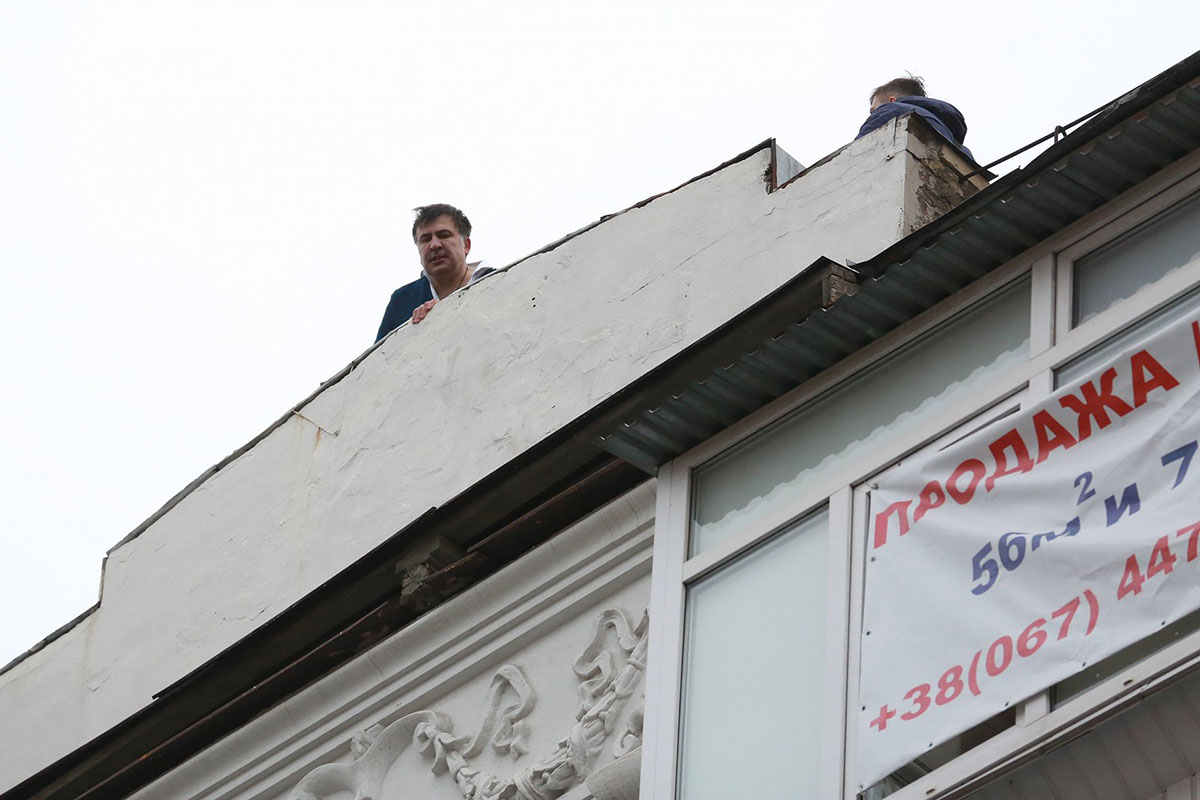
Ex-Georgian President Mikheil Saakashvili stands on the roof of his apartment building on Dec. 5 during an attempt by authorities to arrest him. His supporters blocked police and freed him from custody. (UNIAN) (source)
Lutsenko’s tapes
To prove Saakashvili’s alleged guilt, Lutsenko played what he claimed were intercepted phone conversations allegedly between Saakashvili and Kurchenko and also alleged conversations between Severion Dangadze, an official of Saakashvili’s party, and an unidentified associate of Kurchenko.
The meaning of Saakashvili’s alleged conversation with Kurchenko is unclear, while Gangadze’s alleged conversation with the Kurchenko associate is devoted to the financing of protests by Kurchenko.
Saakashvili said that the tapes had been faked.
Five lawyers said that they saw no evidence of a crime in the recordings, even if they are genuine.
They included Tytych; Mykola Khavronyuk, a law professor at the Kyiv-Mohyla Academy; Sergii Gorbatuk, head of the in absentia investigations unit at the Prosecutor General’s Office; criminal law expert Hanna Malyar, and Halya Coynash, a member of the Kharkiv Human Rights Protection Group.
Khavronyuk said there is no evidence in the recordings that Saakashvili was planning a coup d’etat, and that the financing of protests is not a crime.
Gorbatuk said he suspected that the SBU could have orchestrated the alleged conversations, which could make the whole criminal case illegal, and the Kurchenko associate who allegedly spoke to Dangadze could have been hired by the SBU.
The Saakashvili case has also been lambasted on the grounds that Kurchenko’s firms are still operating in Ukraine, and Poroshenko is successfully cooperating with many Yanukovych allies, who have escaped any punishment for their alleged crimes.
In 2013 Boris Lozhkin, a close associate of Poroshenko and later his chief of staff, sold UMH media group to Kurchenko for $315 million. In 2014 Austrian authorities opened a money laundering investigation into the sale.
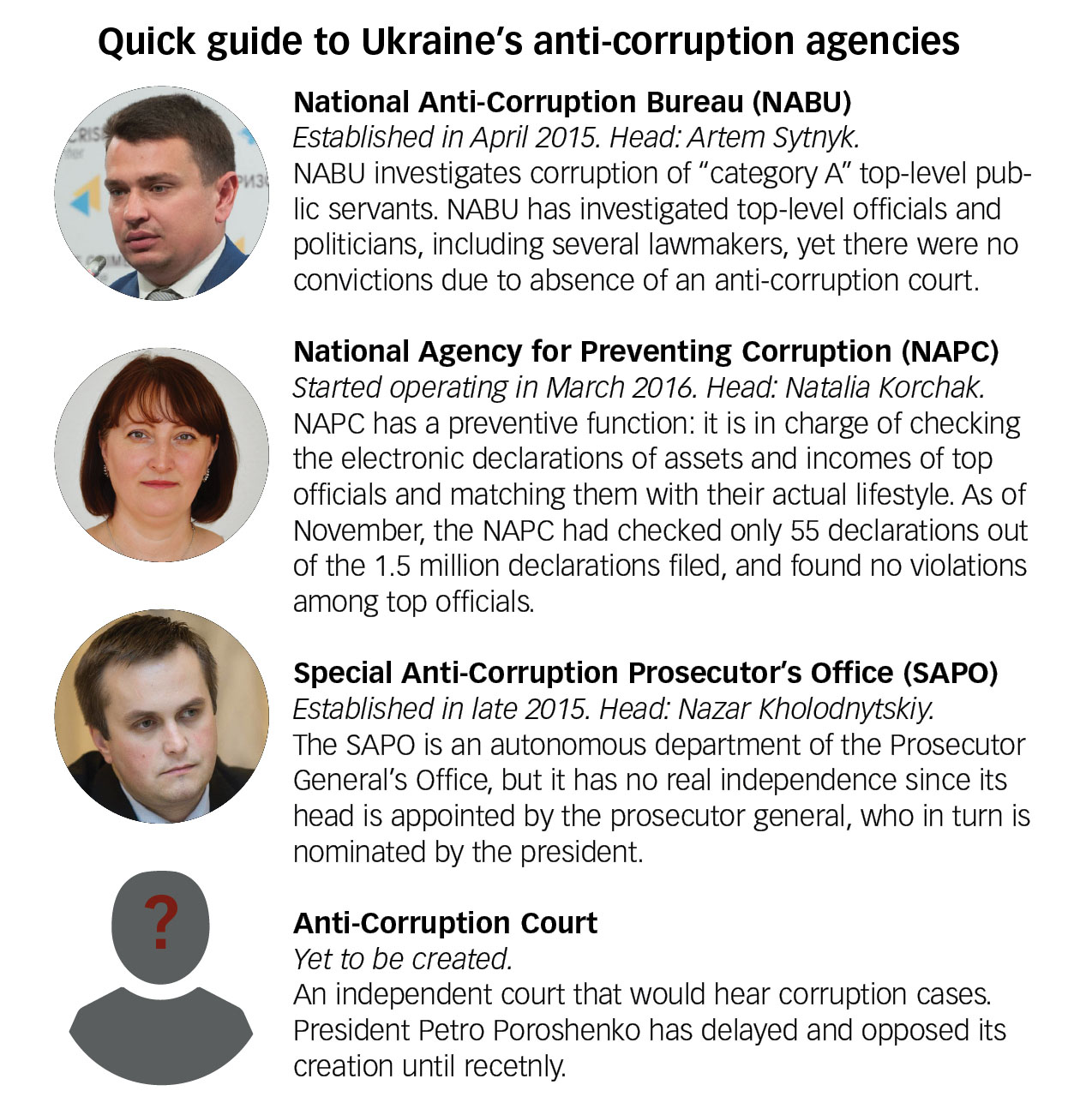
Power games?
Speculation is rife that the People’s Front party, led by ex-Prime Minister Arseniy Yatsenyuk and Interior Minister Arsen Avakov, are not always eager to cooperate with Poroshenko in what his critics say is a campaign to crack down on the opposition and anti-corruption bodies.
The loyalty to Poroshenko of the police, who are directly subordinate to Avakov, came into question when they bungled Saakashvili’s detention. Moreover, Yatsenyuk and Avakov made statements in support of an anti-corruption court and independent auditors of the NABU early on Dec. 7 — under apparent Western pressure.
“Various interests actually want to weaken Poroshenko’s effort to consolidate power in his own hands,” said Balazs Jarabik, a scholar at the Carnegie Endowment for International Peace. “The police could have removed the (protest) tent camp in front of the Verkhovna Rada, but they didn’t do so.”
